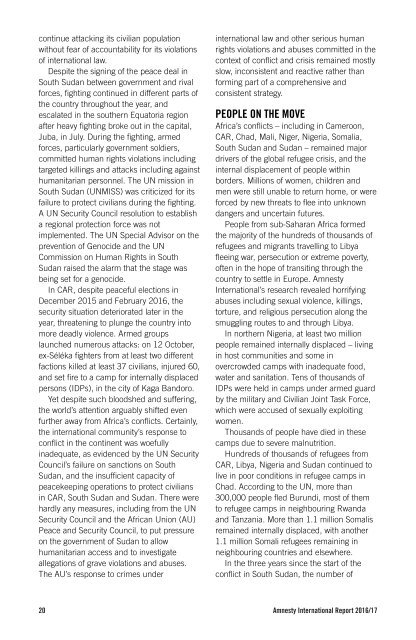AMNESTY INTERNATIONAL REPORT 2016/17
2lEHU9j
2lEHU9j
You also want an ePaper? Increase the reach of your titles
YUMPU automatically turns print PDFs into web optimized ePapers that Google loves.
continue attacking its civilian population<br />
without fear of accountability for its violations<br />
of international law.<br />
Despite the signing of the peace deal in<br />
South Sudan between government and rival<br />
forces, fighting continued in different parts of<br />
the country throughout the year, and<br />
escalated in the southern Equatoria region<br />
after heavy fighting broke out in the capital,<br />
Juba, in July. During the fighting, armed<br />
forces, particularly government soldiers,<br />
committed human rights violations including<br />
targeted killings and attacks including against<br />
humanitarian personnel. The UN mission in<br />
South Sudan (UNMISS) was criticized for its<br />
failure to protect civilians during the fighting.<br />
A UN Security Council resolution to establish<br />
a regional protection force was not<br />
implemented. The UN Special Advisor on the<br />
prevention of Genocide and the UN<br />
Commission on Human Rights in South<br />
Sudan raised the alarm that the stage was<br />
being set for a genocide.<br />
In CAR, despite peaceful elections in<br />
December 2015 and February <strong>2016</strong>, the<br />
security situation deteriorated later in the<br />
year, threatening to plunge the country into<br />
more deadly violence. Armed groups<br />
launched numerous attacks: on 12 October,<br />
ex-Séléka fighters from at least two different<br />
factions killed at least 37 civilians, injured 60,<br />
and set fire to a camp for internally displaced<br />
persons (IDPs), in the city of Kaga Bandoro.<br />
Yet despite such bloodshed and suffering,<br />
the world’s attention arguably shifted even<br />
further away from Africa’s conflicts. Certainly,<br />
the international community’s response to<br />
conflict in the continent was woefully<br />
inadequate, as evidenced by the UN Security<br />
Council’s failure on sanctions on South<br />
Sudan, and the insufficient capacity of<br />
peacekeeping operations to protect civilians<br />
in CAR, South Sudan and Sudan. There were<br />
hardly any measures, including from the UN<br />
Security Council and the African Union (AU)<br />
Peace and Security Council, to put pressure<br />
on the government of Sudan to allow<br />
humanitarian access and to investigate<br />
allegations of grave violations and abuses.<br />
The AU’s response to crimes under<br />
international law and other serious human<br />
rights violations and abuses committed in the<br />
context of conflict and crisis remained mostly<br />
slow, inconsistent and reactive rather than<br />
forming part of a comprehensive and<br />
consistent strategy.<br />
PEOPLE ON THE MOVE<br />
Africa’s conflicts – including in Cameroon,<br />
CAR, Chad, Mali, Niger, Nigeria, Somalia,<br />
South Sudan and Sudan – remained major<br />
drivers of the global refugee crisis, and the<br />
internal displacement of people within<br />
borders. Millions of women, children and<br />
men were still unable to return home, or were<br />
forced by new threats to flee into unknown<br />
dangers and uncertain futures.<br />
People from sub-Saharan Africa formed<br />
the majority of the hundreds of thousands of<br />
refugees and migrants travelling to Libya<br />
fleeing war, persecution or extreme poverty,<br />
often in the hope of transiting through the<br />
country to settle in Europe. Amnesty<br />
International’s research revealed horrifying<br />
abuses including sexual violence, killings,<br />
torture, and religious persecution along the<br />
smuggling routes to and through Libya.<br />
In northern Nigeria, at least two million<br />
people remained internally displaced – living<br />
in host communities and some in<br />
overcrowded camps with inadequate food,<br />
water and sanitation. Tens of thousands of<br />
IDPs were held in camps under armed guard<br />
by the military and Civilian Joint Task Force,<br />
which were accused of sexually exploiting<br />
women.<br />
Thousands of people have died in these<br />
camps due to severe malnutrition.<br />
Hundreds of thousands of refugees from<br />
CAR, Libya, Nigeria and Sudan continued to<br />
live in poor conditions in refugee camps in<br />
Chad. According to the UN, more than<br />
300,000 people fled Burundi, most of them<br />
to refugee camps in neighbouring Rwanda<br />
and Tanzania. More than 1.1 million Somalis<br />
remained internally displaced, with another<br />
1.1 million Somali refugees remaining in<br />
neighbouring countries and elsewhere.<br />
In the three years since the start of the<br />
conflict in South Sudan, the number of<br />
20 Amnesty International Report <strong>2016</strong>/<strong>17</strong>


